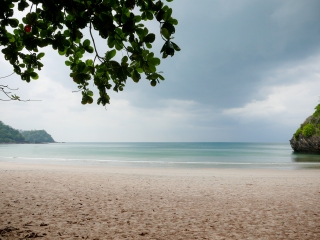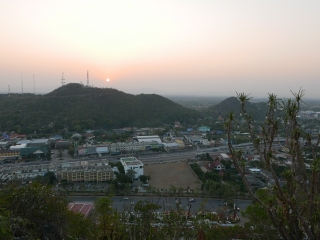Celebrating your birthday while you travel generates all sorts of temptations to spoil yourself. I gave in to one of these temptations and decided to spend my birthday in style on Koh Lanta, a developed island which doesn’t rank so high on the touristy scale. I rented a decent bungalow in a small resort run by a very young Muslim couple—it was cheap by local standards, but still the most expensive accommodation of my entire trip. “Birthday treat,” I told myself. I ate Westernized Thai food at restaurants highly recommended by travel guides. I rented a scooter, copied a list of “10 things to do in Koh Lanta” onto my phone, and drove up and down the island the whole day, ticking off places and attractions. An easy and relaxing day, with everything served on a tray. Birthday treat.

When I return to my bungalow after a magical sunset ride, I briefly look back on the day. It was fun, but I almost forgot I am in Thailand. I could have had a similar experience on many other developed islands. When the tourist infrastructure takes over a place, it brings along many benefits. It is a system that works well, straightforward, predictable, safe, a bubble in which a certain kind of exchange is predominant: one side offers money, the other side offers leisure. Everyone in the bubble has their role defined by these transactions. Even the little daughter of the restaurant owners where I had my birthday meal: her parents, barely speaking a few English words themselves, were raising her with English Youtube so that she would fit a predefined role someday. When the exchange revolves around money and services, and being a seller or a buyer is everything that is expected of you, and you know that by filling this role you help the system live on, there’s little at stake in suddenly being ‘Thai’ or ‘Romanian’ and exchanging something from this perspective. There’s just the prefabricated narrative of the guided tour or the stereotypical small talk while waiting for the pancake: “Oh, I know a famous football player from your country”; or “Do you get many customers during the rainy season?”. Despite their admirable efficiency, these ‘everywhere places’ suffocate the local, the authentic—which is not necessarily a problem, unless you want to give a bit more than money and polite curiosity, and expect to receive a bit more than services and stereotypical answers in return.
I decide to leave Lanta the next day. And with it the whole gulf part of Thailand. A 21-hour combination of buses and train should take me to Phetchaburi, a less-known provincial town with a rich history and many temples up its sleeve, 2 hours south of Bangkok. Time for some serious travel action.
Next morning, the cicadas wake me up at 5:00am, which gives me plenty of time to prepare for the long journey. I ask the resort owner to get me a minibus ticket to Trang—another thing you get on a tray on this island. The minibus gives me a free final tour while it circles the whole island to pick up the other passengers. Thai drivers are magicians of space: when you’d think the minibus is packed beyond capacity and safety guidelines, they still find room for two extra people and their bags, improvising seats with small wooden chairs and vigorously pushing the backpacks to flatten them. And thus we take off, sardines anesthetized by torrents of A/C.

In Trang, considered a typical Thai town, the bus station is semi-deserted in the afternoon heat. I climb in a songthaew and the driver keeps me company while we wait for enough clients. He is divorced, his wife has obtained custody of the children, and he lives a lonely life. I pity him, though he assures me with serenity that he is quite happy eating, sleeping, and reading the newspaper every day. At the train station, I manage to book a lower berth to Phetchaburi, despite prior warnings that the train would be full. I have some time to kill before the departure, so I roam around and stumble upon a market. It is almost closing time, and tired vendors clean up their stalls almost mechanically, as if this would make any difference among all the piles of dirt. A fat white cat has its overdose of beauty sleep, while rats run back and forth a few meters away. The place begs to be photographed, but I am too conspicuous, a farang in this market for locals. All eyes are fixed on me, and I sheepishly abandon my endeavor. It was an insignificant moment at the time, but the beginning of something in the larger story of my trip.

Surprisingly the train is made up of a single open compartment, and not separate cabins, as I had expected. My berth consists initially in two facing seats, and I switch between them to spy on my fellow passengers. They are all Thais: a couple in their 40s taking all sorts of affectionate postures, a lonely man with his bottle and dubious suitcase, two children intermittently falling asleep on their grandma. A few hours later we reach a major transportation hub and the car fills with passengers. The Eastern Oriental Express, a luxury train that revives the golden age of railway travel, pulls up next to us, and through our windows we see wooden bedroom suites and glowing dining cars. From one, four elderly Americans around their opulent dinner table wave to me and raise their glasses. Yep.

At nightfall, the car attendant fastidiously mounts and equips each berth; suddenly everyone can pull a curtain and have their private space, and the car undergoes a radical transformation. They turn on the A/C generously and, after putting on my only long-sleeved shirt, I still have to wrap myself in the towel they gave me to keep warm. I wake up at 4:00am after repeated nightmares about missing my stop. Everyone in the car is sound asleep, and a neatly ironed uniform hanging besides a berth informs the needy passenger where the attendant is sleeping. One hour later, a sleepy assistant announces me that my stop is coming up next. When I leave the cryogenic train, my glasses fog up, obstructing my first view of Phetchaburi.





Leave a Reply